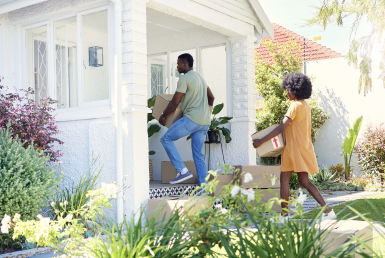The Strength of the Homeowner Market in South Africa

The pandemic has negatively affected South African sectors in various ways and and investment in the South African Real Estate market is starting to slow, particularly in the commercial and industrial sector, as well as the residential sector, as running costs have increased substantially reducing rental yields and all indicators show that more increases are expected. But, it is quite different for homeowners, especially in the low to middle market, where home ownership is often more affordable than renting, and this sector reflects a more optimistic picture.
To our surprise, the ensuing ripples from the waves of Covid-19 have had some positive effects on the property market, creating interesting changes and favourable trends. The following trends speak to the larger, gradual pandemic-related adjustments, shifts, and changes we have all made, and will continue to have to make in South Africa, and internationally.
Lovely, Low Interest Rates
Lending interest rates have plummeted significantly since early last year. This single-digit interest rate trend has continued into 2021, and as of May the average lending interest rate in South Africa currently stands at 7%. Essentially, this means that first-time buyers are more easily able to break into the property market without the foreboding weight of high interest on their shoulders. It also means that the market may still attract repeat buyers and investors.
We are in a Buyer’s market
It isn’t the first time you’ve heard the phrase “buyer’s market” and it won’t be the last. First-time buyers, who were previously renters, have seen the benefits of finding a property for sale and paying off their own bonds instead of someone else’s. In the current climate, they have been able to gain a footing in the buyer’s market and actively invest in property. Buying is an attractive choice because properties are currently more affordable due to sellers lowering their prices, low interest rates, and high instances of bond approval. Bond approval rates for first-time buyers were at a staggering 80,63% in June according to MulitNet.
First-time Buyers are Shaking Things Up
First-time millennial buyers are moving away from rentals and towards buying homes that they typically couldn’t afford before 2020. Deterred by the hefty deposit and repayments, and choosey bond approvals, young people in their thirties previously had much less choice. Gaining security through property investment is now beginning to gain traction amongst this age group. Although low interest rates benefit all buyers, the first-time buyer is at a distinct advantage given that recent bond approval rates are so high.
According to Multinet the average age of bond applicants is 36 for home buyers, and 35 years old for first-time home buyers. This age group is breaking into the market during this exceptional time and coming in at an average purchase price of just under R1 million. Furthermore, in the sectional title realm, women seem to be the predominant first-time buyers at the moment, making up more than their male counterparts.
The Lockdown Blues
Although things are looking good for young bond applicants and buyers in general, there seem to be a few factors that are slowing down the buying process. Tightening lockdown restrictions tend to cause the various Deeds Offices to remain closed or create a shortage of staff, inevitability delaying the processing of transfers and registrations for bonds. To mitigate delays, use our bond calculator, and get preapproval on your bond; so that when you are registering, your bank knows that you are financially secure. Luckily for those who are purchasing homes for less than one million Rand, transfer fees do not apply.
Retrenchment and Property Trends
As we know, industries that were deemed ‘unessential’ have taken a huge knock in the wake of the pandemic. Industries such as hospitality, entertainment, and tourism, in particular, have had to tighten their belts, cut back, work from home, or retrench their staff or be at risk of becoming insolvent. Two trends have emerged from this phenomenon:
Firstly, those retrenched have had to find work in other industries – often in lesser-paying jobs – and give up their current home rentals for something cheaper, or potentially sell their homes to accommodate their lifestyle change. Secondly, owners of vacant offices, buildings, and businesses have started to look into converting their properties into residential units. Their exceptional proximity to business hubs is attractive to apartment buyers and creates potentially lucrative and advantageous opportunities for otherwise suffering, large property owners.
Living Further Away from the City
Many South Africans have been forced to work from home, learn to communicate on new video platforms, and adjust to a new way of life. People are not only realising that they can work from home, but that they would like to work remotely from a home that allows for comfort, space, and a work-conducive environment. Perhaps in time, without having to commute to work in the cities, people can choose to live in bigger, more affordable homes in peripheral areas or anywhere in South Africa. Now, when looking for homes, people may more often consider an extra bedroom to convert into an office space. If you’re dreaming of a new location, view our website for ideas. Find an office close by and find an agent to help you.
Access-controlled, Gated Sectional Titles are in Vogue
Another popular trend that has been developing for some years now is gated, access-controlled communities with sectional titles. Lockdowns, quarantines, and isolation may have left people feeling disconnected, and living in a complex or gated community allows for safe, open space and the opportunity to live amongst people, share amenities, all while safely distanced from one another. This ‘lock up and go’ lifestyle suits young singles and couples who don’t need much space, but want security. Some affluent gated communities in South Africa include spas, golf courses, and even their very own schools.
Co-living
A similar but more inclusive model than the gated community called ‘co-living’ was created in recent years. Essentially, people with shared interests, values, or professions can live full-time in a hotel-like environment, with shared amenities and many services included in the cost. These residential ‘hotels’ are run by third parties that create a clean, safe environment where people have an opportunity to network, share ideas, and live and work together. There are currently two co-living buildings in Southern Africa. One is in Eros, Windhoek, and the other is in Cape Town’s trendy CBD. The units come fully furnished, leases are flexible and the amenities span from a shared pool to cooking classes and organised community events.
Living off the Grid
Climbing utility costs and a growing lack of faith in service delivery from municipalities have led some South Africans to seek out property that allows for more long-term, sustainable, and efficient energy alternatives. Some people are creating these homes by adding solar panels to their roofs, buying petrol-run generators or installing inverters, as well as the addition of water tanks connected to rain collection gutter systems. Others plan to live off the grid entirely, for the above-mentioned reasons and also to live a more eco-friendly lifestyle while lowering their carbon footprint.
More Pressure on property professionals to have Online Presence
The lives of buyers, sellers, tenants, and renters have changed substantially in the past two years. In turn, adjusting to this changing market, real estate agencies have been forced to change too. Companies like Property.CoZa which constantly update and revise their business practices – such as building their online presence – have been able to stay afloat during the pandemic. Unfortunately, others have had to close shop as they failed to adapt.
“The recent introduction of our MyCoZa App, developed for our own sales force, has greatly improved our Property Professional’s response time and our matchmaking tool provides quick and effective options for buyers to view,” says Sandy Walsh, Managing Director, Property.CoZa South Africa. Our Property Professionals have been able to work from home and utilise our specifically tailor-made systems, ensuring that they continue to provide their services. “At this juncture, real estate agencies need to make major structural adjustments or they will be left behind,” says Walsh.




